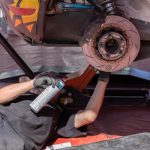Dont ask us to do it wrong..
We have had customers come in wanting us to do what we call a pad slap. A pad slap is when you just put new brake pads on and do nothing to resurface the rotor surface. When I get asked to do a pad slap I always hear my Automotive Tech School instructor’s voice in my head saying “Never, never, never put new pads on an old rotor surface!” While a pad slap is, in theory, cheap and fast, you are doing your car and yourself wrong.
A used rotor surface has a mirror like finish that you won’t see on a new rotor. When you put new pads on an old glazed rotor you are messing with the friction coefficient that is designed to stop the car in all situations.Sometimes customers come in and their brake pads look great as far as thickness, but they are saying that they have a vibration when braking, especially on the highway. What has happened is the brake rotor over time has been exposed to excessive heat and cold, which causes the rotor to warp and they are feeling this as a shake/vibration when braking. Rotors must either be replaced or machined when pads are replaced.
We first measure the old rotors to make sure there is enough material to be machined (cut) off so that the rotor does not go below the minimum thickness specification. At Jammin J Automotive we have a Procut On Car Brake Lathe, which will do what is called Machine Matching of the brake rotors. The Procut Machine machines the rotor while still on the vehicle and literally matches it to the wheel bearing and hub; the result is a beautiful new braking surface which is balanced to the vehicles rotating parts associated with that wheel’s braking system which equals safe and very smooth braking. When we purchased the machine we were told by the technician that even new rotors should be machined and we thought he was crazy. After measuring and testing new rotors over the course of several weeks, we were shocked at how many needed resurfacing (all of them!) to correct for inconsistencies in the rotor’s surface and now we Machine Match all new and existing brake rotors to ensure the best braking performance possible on every brake service we perform. To view what this process actually looks like, click here to view a video.
Here are some pictures of a customer’s rotors who wanted just pads only, showing both sides of the rotor. While the side of the rotor that was visible through the wheel doesn’t look so bad, the back side clearly has extensive rust and very severe grooves that are just too deep to machine out of the rotor.
In the realm of car maintenance, there’s a clear line: do it right or risk the consequences. When it comes to handling your vehicle, cutting corners is not an option. From routine oil changes to complex repairs, ensuring the job is done correctly is paramount. Embrace the importance of quality service and meticulous attention to detail when it comes to caring for your car. Don’t settle for subpar job that could compromise your safety on the road. Stay tuned as we delve into the dos and don’ts of car maintenance, guiding you on the path to keeping your vehicle in top-notch condition.

Understanding Car Buying
Key Terminology
When buying a car, it’s crucial to understand key terms like MSRP, APR, and leasing. These terms impact your overall purchase experience significantly. For instance, knowing the difference between APR and interest rate can help you save money.
To ensure a smooth car buying process, grasp essential jargon such as “down payment,” “trade-in value,” and “extended warranty.” Understanding these terms empowers you to make informed decisions and avoid costly mistakes.
Dealer Expectations
Dealers expect buyers to be knowledgeable about the vehicle they want, their budget, and financing options. By meeting these expectations, buyers can establish trust with dealers, trade, and streamline the purchasing process.
Meeting dealer expectations by being prepared for negotiations can result in more favorable deals. Dealers appreciate buyers who are decisive, responsive, and willing to engage in fair discussions.
Buyer’s Rights
Buyers have rights when purchasing a car, including the right to accurate information about the vehicle’s history and condition. Knowing these rights enables buyers to demand transparency from dealers and protect themselves from fraudulent practices.
Asserting buyer’s rights during negotiations can prevent being misled or pressured into unfavorable agreements. For example, understanding the right to a test drive allows buyers to assess the vehicle’s performance before committing to a purchase.
Preparing for Negotiation
Research Prices
Buyers should research car prices from various sources to make informed decisions at times. By comparing prices, buyers can identify fair market prices and avoid overpaying. Tips include checking online listings, consulting pricing guides, and visiting multiple dealerships.
Budget Setting
Setting a realistic budget is crucial when purchasing a car. Buyers must consider all costs such as insurance, maintenance, and registration fees beyond the car price. To set a suitable budget, buyers should assess their financial situation, determine monthly expenses, and factor in potential loan payments.
Trade-in Value
Determining the trade-in value of a car accurately is essential before negotiation. Strategies for negotiating a fair trade-in value with dealers include researching the car’s current market value and highlighting its well-maintained condition. Maximizing the trade-in value involves presenting service records, cleaning the vehicle thoroughly, and being prepared to negotiate.
Mistakes to Sidestep
Oversharing Information
When buying a car, be cautious about sharing excessive personal details that could compromise your privacy with people. Avoid disclosing sensitive information like your social security number or financial data. Protecting personal data is crucial in safeguarding yourself from potential identity theft.
Rushing Decisions
Making hasty car-buying decisions can lead to regret and financial strain. Taking time to weigh your options allows for better choices and prevents impulse purchases. To avoid rushing, research different cars, compare prices, and consider test-driving multiple vehicles.
Ignoring Financing Terms
Understanding financing terms before signing any contracts is essential to prevent future financial troubles. Buyers should familiarize themselves with terms like interest rates, loan duration, and monthly payments. Ignoring these details could result in high-interest rates or unexpected fees down the road.
Pitfalls in Negotiation
Lowball Offers
Buyers should be cautious of lowball offers that significantly undervalue the car’s worth. Identify and counter these offers effectively. Accepting extremely low offers can lead to financial losses and dissatisfaction with the deal outcome. Negotiation tactics such as firmly stating the fair value of the car and being prepared to walk away can deter lowball offers.

Last-minute Add-ons
Last-minute add-ons from dealers may seem enticing but can inflate the total cost of the purchase unexpectedly. Agreeing to last-minute add-ons without careful consideration can impact the overall deal negatively. To handle last-minute add-on offers, buyers should evaluate the necessity of each add-on and negotiate for reasonable prices.
Extended Warranties
Extended warranties offer additional coverage beyond the manufacturer’s warranty but come with added costs and limitations. Consider the pros and cons of extended warranties before making a decision on purchasing one. Evaluate your driving habits, maintenance history, and potential repair costs to determine if an extended warranty is necessary.
Trading In Smartly
Timing Matters
Timing plays a crucial role in car purchases. Choosing the right time can lead to significant savings. For optimal deals, consider buying a car towards the end of the year when dealerships aim to clear out old inventory. This period often coincides with holidays or major sales events like Black Friday.
Factors such as seasonal trends and new model releases can impact pricing and availability. During these times, dealers may offer discounts or incentives to move existing stock, benefiting buyers seeking a good deal. By being aware of these patterns, you can capitalize on favorable market conditions.
Appraisal Insights
Understanding the appraisal process is essential when trading in a car. Appraisals determine the value of your vehicle based on factors like mileage, condition, and market demand. To improve appraisal value, ensure your car is clean, well-maintained, and has up-to-date service records.
Factors influencing appraisal value include age, mileage, overall condition, and market demand for specific models. repairs or upgrades can positively impact the valuation. Before an appraisal, consider detailing your car and addressing any minor issues to enhance its appeal.
Negotiating Trade-in
Negotiating a trade-in deal requires strategy and preparation. Start by researching your car’s value using online tools or getting multiple appraisals. Having this information empowers you during negotiations and prevents accepting low offers.
Leverage your trade-in as a bargaining chip for better overall pricing on your new purchase. For instance, if the dealer offers a lower trade-in value than expected, negotiate for a higher amount or seek other incentives like reduced financing rates or additional accessories included in the deal.
Research the market value of your car
Present maintenance records to showcase care
Be prepared to walk away if terms are unfavorable
Please be wary of ads that speak of brake repair based upon how inexpensive it is. When it comes to brakes, they are the #1 safety system on a car and we will not cut corners just to save a buck. Brakes that are done correctly are safer, last longer, and cost less over the long haul. It is always important to use the proper quality of braking system parts that are recommended for your specific vehicle’s needs. Here at Jammin’ J Automotive, we do brakes right or we don’t do them! Our goal is to keep our customers on the road in a safe vehicle with the best possible braking equipment.
